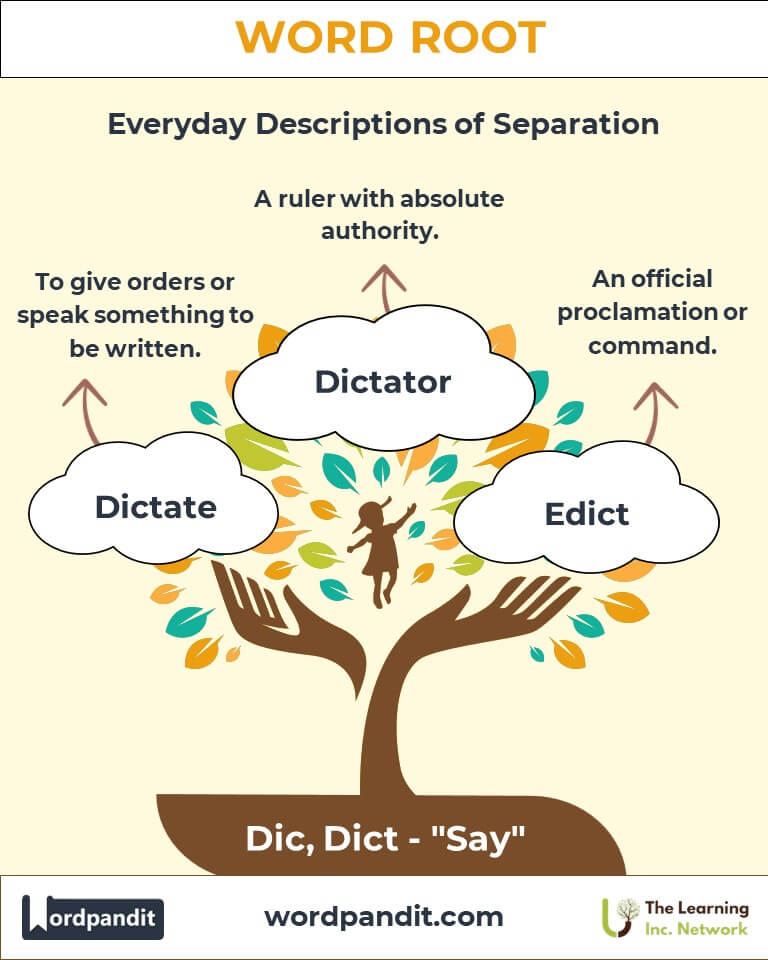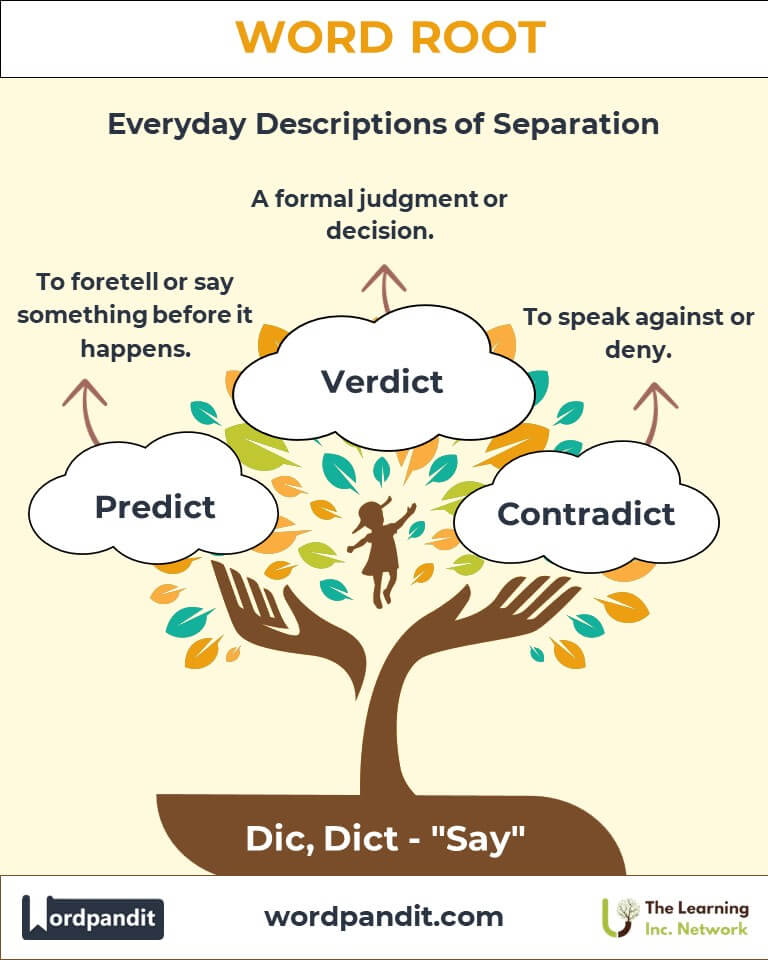Dict, Dic: The Roots of Speaking Power and Expression
Discover the profound impact of the Latin roots "dict" and "dic," meaning "say" or "speak." These roots form the foundation of many words central to communication, authority, and foresight, such as "dictate" and "predict." Through exploring these roots, we unravel their journey from ancient linguistic origins to their relevance in modern language and specialized fields.

Table of Contents
- Introduction: The Essence of Dict and Dic
- Etymology and Historical Journey
- Mnemonic: Unlocking the Power of Dict and Dic
- Common Dict/Dic-Related Terms
- Dict and Dic Through Time
- Dict and Dic in Specialized Fields
- Illustrative Story: Dict in Action
- Cultural Significance of Dict and Dic
- The Dict/Dic Family Tree
- FAQs about the Dict/Dic Word Root
- Test Your Knowledge: Dict and Dic Mastery Quiz
- Conclusion: The Enduring Legacy of Dict and Dic
1. Introduction: The Essence of Dict and Dic
Imagine the power of words—the ability to inspire, command, or predict the future. The Latin roots "dict" and "dic," meaning "say" or "speak," have shaped words that define authority and communication. From dictating a letter to predicting outcomes, these roots remind us of the influence and significance of speech and expression.
Pronunciation: "dict" (dihkt) and "dic" (dik).

2. Etymology and Historical Journey
The roots "dict" and "dic" trace back to the Latin verb dicere, meaning "to say" or "declare." In ancient Rome, dictum referred to a formal pronouncement or saying, often tied to legal and political authority. Over centuries, these roots merged with Old French and English, giving rise to words like "dictate," "predict," and "dictionary." Their evolution underscores the timeless importance of spoken and written words in law, governance, and everyday life.
3. Mnemonic: Unlocking the Power of Dict and Dic
To remember "dict" and "dic," visualize a wise oracle predicting the future (predict), while a stern figure gives commands (dictate).
Mnemonic Device: "Dict delivers declarations, and Dic speaks with foresight!"
4. Common Dict/Dic-Related Terms
- Dictate (dik-tayt): To give orders or speak something to be written.
Example: "The teacher dictated a letter for the students to copy." - Predict (pre-dikt): To foretell or say something before it happens.
Example: "Meteorologists predict sunny weather for the weekend." - Dictator (dik-tay-ter): A ruler with absolute authority, often one who commands.
Example: "The dictator issued strict laws to maintain control." - Contradict (kon-truh-dikt): To speak against or deny.
Example: "His actions contradict his earlier statements." - Dictionary (dik-shuh-nair-ee): A reference book or resource containing words and their meanings.
Example: "She consulted the dictionary to understand the unfamiliar term." - Verdict (vur-dikt): A spoken declaration of judgment or decision.
Example: "The jury delivered a unanimous verdict of 'not guilty.'"
5. Dict and Dic Through Time
- Dictatus (Medieval Latin): A formal statement or command issued by authority.
Historical Use: Dictatus Papae, or "Dictates of the Pope," was a collection of authoritative statements from the 11th century. - Predict (17th Century): Originally used in astrology and divination to foresee future events.
Modern Shift: Now associated with scientific forecasting, such as weather predictions.
6. Dict and Dic in Specialized Fields
Law:
Verdict: A legal judgment or conclusion by a jury or judge.
Example: "The verdict upheld the defendant’s innocence."
Technology:
Dictation Software: Programs that convert spoken words into text.
Example: "Dictation software simplifies transcription tasks."
Psychology:
Predictive Analysis: Studying behavior patterns to forecast outcomes.
Example: "Predictive algorithms are reshaping mental health diagnostics."
Linguistics:
Dictionary: A cornerstone tool in studying language evolution and meaning.
Example: "Dictionaries document linguistic changes over time."
7. Illustrative Story: Dict in Action
Once, in an ancient kingdom, a wise oracle known as Dicara foretold a great storm (predict). Acting swiftly, the ruler dictated evacuation orders (dictate), saving countless lives. The oracle's words inspired the people, reminding them of the power of speaking and acting with clarity.
8. Cultural Significance of Dict and Dic
The roots "dict" and "dic" symbolize the cultural weight of spoken and written declarations. From ancient laws inscribed on tablets to modern digital assistants interpreting voice commands, these roots reflect humanity's evolving relationship with communication and authority.

9. The Dict/Dic Family Tree
- Doc (teach):
Example: Doctrine: A set of beliefs or teachings. - Scrib/Script (write):
Example: Manuscript: A written document. - Log (word, study):
Example: Dialogue: A conversation between two or more people.

10. FAQs About the Dict/Dic Word Root
Q: What do the roots "dict" and "dic" mean?
A: The roots "dict" and "dic" come from the Latin verb dicere, meaning "to say" or "to declare." They are used in words that relate to speaking, declaring, commanding, or even predicting events.
Q: How do "dict" and "dic" differ in usage?
A: Both roots carry the same meaning but are used in different forms of words. "Dict" often appears in nouns and adjectives (e.g., "dictator," "dictation"), while "dic" is more common in verbs like "predict" or "contradict."
Q: What is the origin of the word "dictionary"?
A: "Dictionary" comes from the Medieval Latin dictionarium, meaning "a collection of words and their meanings." This highlights the root's focus on speech and definitions.
Q: What does it mean to "contradict" someone?
A: To "contradict" means to speak against or deny what someone else has said. It comes from the Latin contra- (against) and dicere (to speak).
Q: What is a "verdict," and why is it significant?
A: A "verdict" is a formal judgment or decision made in a legal context. It comes from the Latin verus (true) and dictum (a saying), meaning "a true statement."
Q: How does "predict" differ from "forecast"?
A: Both words involve foreseeing future events, but "predict" emphasizes spoken or declared foresight, often based on knowledge or intuition. In contrast, "forecast" typically involves observation and data analysis.
Q: What does "edict" mean, and how is it used?
A: An "edict" is an official proclamation or command issued by an authority, such as a king or government. It derives from the Latin e- (out) and dicere (to say).
11. Test Your Knowledge: Dict and Dic Mastery Quiz
1. What do "dict" and "dic" mean?
2. Which word means "to foretell the future"?
3. What is a "dictionary"?
4. Which word describes a formal judgment?
5. What does "contradict" mean?
12. Conclusion: The Enduring Legacy of Dict and Dic
The roots "dict" and "dic" continue to influence how we express authority, knowledge, and foresight. From courtroom verdicts to everyday predictions, these roots remind us of the power of words in shaping the world. As language evolves, the legacy of "dict" and "dic" will persist, inspiring clarity and command in communication.














